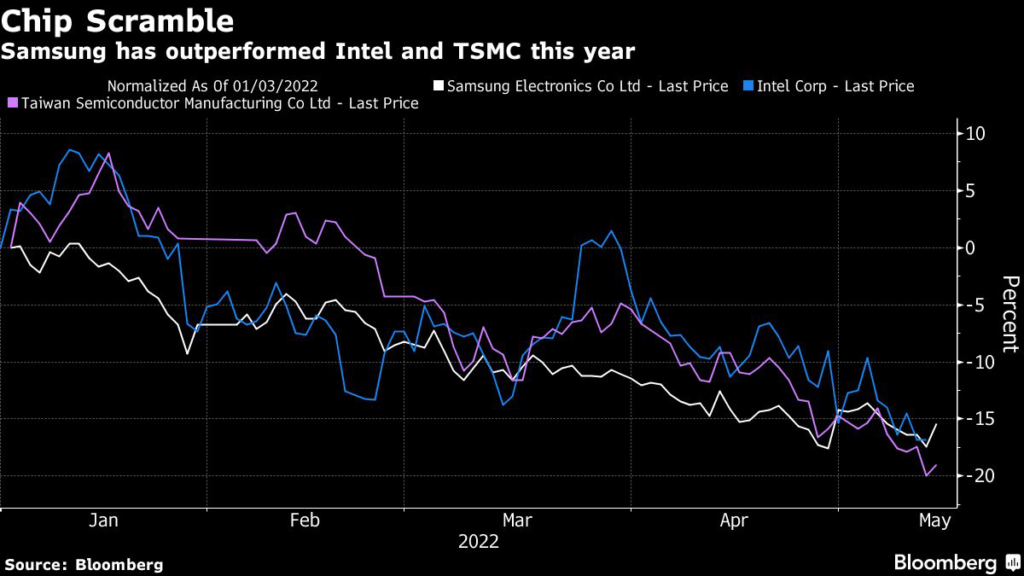(Bloomberg) — Samsung Electronics Co. is talking with foundry clients about charging as much as 20% more for making semiconductors this year, joining an industry-wide push to hike prices to cover rising costs of materials and logistics.
Contract-based chip prices are likely to rise around 15% to 20%, depending upon the level of sophistication, according to people familiar with the matter, who asked not to be identified due to the sensitivity of the issue. Chips produced on legacy nodes would face bigger price hikes, they said. New pricing would be applied from the second half of this year, and Samsung has finished negotiating with some clients, while it is still in discussions with others, the people said.
Samsung’s decision is a shift from its relatively stable pricing policy last year, when the industry rushed to raise prices in the wake of a global chip shortage. The company is facing multiple macro risks such as the war in Ukraine, lockdown measures in China, rising interest rates and inflation. That’s throwing a wrench into business plans typically made a few years in advance.
A Samsung spokesman declined to comment.
The move translates into additional pressure on makers of smartphones, cars and game consoles to lift the prices consumers pay. Samsung and Taiwan Semiconductor Manufacturing Co. account for more than two-thirds of global capacity for outsourced chips.
Manufacturing costs for chipmakers are now rising at about 20 to 30% on average on all fronts, from chemicals, gas and wafers to equipment and construction materials.
Read more: Samsung Warns of ‘Immense’ Risks After Reporting Surge in Profit
Contract chip manufacturers including TSMC and United Microelectronics Corp. are warning clients that they plan to raise prices by a mid-to-high single digit percent, on the heels of a price hike several months ago. The industry leader TSMC has told clients that it plans to raise prices by about 5% to 8% from 2023, following a 20% price hike last year, according to the Nikkei. UMC is also planning another round of 4% price hikes in the second quarter. ASML Holding NV — a key supplier to Samsung and TSMC — warned last month of rising pressure on labor costs, in addition to higher material costs and transportation costs.
The shortage forces customers to prioritize the ability to procure and secure the chips they need over prices. Semiconductor makers have been trying to improve profitability, partly by shifting more weight to high-end chips, said Masahiro Wakasugi, Bloomberg Intelligence analyst.
“This is an inevitable move for Samsung,” with costs rising on everything from power and equipment to materials and freight, Wakasugi said. “Some customers may accept higher prices if they can get chips earlier than others,” he said.
Read more: Samsung Intensifies Chip Wars With Bet It Can Catch TSMC by 2022
Samsung is the world’s biggest memory chipmaker, but it is catching up to TSMC in order-based chip manufacturing. Consumer PC and smartphone demand is waning, but tech companies said during earnings calls they expected strong 5G-related enterprise demand for new servers with more capacity and requiring more chips. The industry expects overall foundry demand to exceed supply, which will remain tight for the next five years.
Samsung already is fielding orders for the next five years that together represent around eight times that of the previous year’s revenue, said Kang Moon-soo, executive vice president at Samsung’s foundry business, during a recent earnings call. “We expect our order book to continue to grow.”
South Korea’s biggest company spent more than $36 billion on expanding its chip division in 2021, eclipsing rivals as it acquired cutting-edge gear such as extreme ultraviolet lithography machines. The company, which last year dethroned Intel Corp. to become the world’s biggest chipmaker by revenue, has declared it wants to overtake TSMC and become the biggest player in the $400 billion foundry business of making chips for global corporations like Qualcomm Inc. and Nvidia Corp.
Shares of the Korean tech giant have fallen recently amid a broader tech-sell off and partly due to investors’ concerns over the foundry business’ slower-than-expected improvement in production yields. Samsung has said the market’s concerns were “excessive,” and that it’s on track to improve the yield on 4-nanometer nodes. It’s planning to start mass production of 3-nm based chips within this quarter, it said.
More stories like this are available on bloomberg.com
©2022 Bloomberg L.P.











